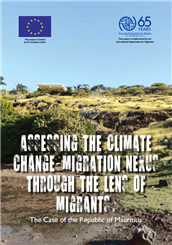Assessing the climate change–migration nexus through the lens of migrants: the case of the Republic of Mauritius
 This report presents the findings of the household survey and qualitative interviews conducted in the framework of the European Union–funded Migration, Environment and Climate Change: Evidence for Policy (MECLEP) project. The study investigates to what extent migration can be seen an adaptation strategy to environmental and climate change in the country. The survey reveals that migration is associated with positive impacts on income and employment levels and, to a lesser extent, with trade and investments. Moreover, migration often helps to improve health conditions and education, and thus has a positive impact on the well-being of migrant households. However, the survey also pointed out that migrant households have, on average, lower income levels than non-migrant households and often face challenges in relation to security, discrimination and housing – issues that are linked to the general socioeconomic development and urban planning of the country.
This report presents the findings of the household survey and qualitative interviews conducted in the framework of the European Union–funded Migration, Environment and Climate Change: Evidence for Policy (MECLEP) project. The study investigates to what extent migration can be seen an adaptation strategy to environmental and climate change in the country. The survey reveals that migration is associated with positive impacts on income and employment levels and, to a lesser extent, with trade and investments. Moreover, migration often helps to improve health conditions and education, and thus has a positive impact on the well-being of migrant households. However, the survey also pointed out that migrant households have, on average, lower income levels than non-migrant households and often face challenges in relation to security, discrimination and housing – issues that are linked to the general socioeconomic development and urban planning of the country.
